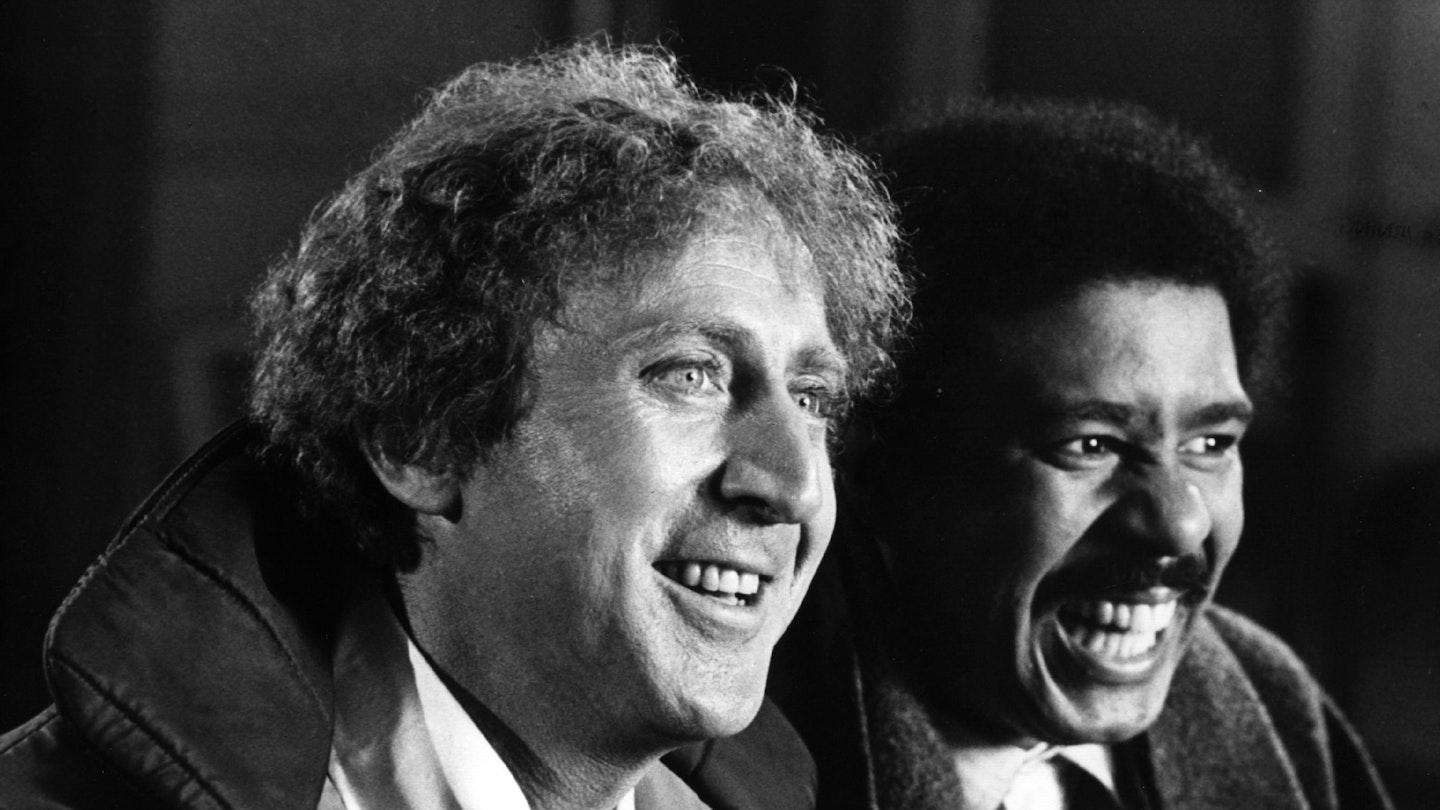Zany is the word for the comedy genre inhabited, for a time dominated, by funnyman writer-director-producer and sometime actor Mel Brooks. Brooks tickled , the masses and broke ground in I brash, bad taste burlesques, with the compulsive lunacy of farting I cowboys in Western spoof Blazing Saddles (1974), a tap dancing master and monster in Young Frankenstein (1974), and a birdshit attack in Hitchcock spoof I High Anxiety (1977). But The Producers, his first feature, is his gem. It's less vulgar and much more dangerous than anything else in his [ oeuvre — which is why it was not comparably commercial on its release, although it did win Brooks kudos, a fan base and the Oscar for his screenplay. It's a classic, tar-fetched farce with a gasp-Mucingly ironic notion: a New York showbiz Jew, however deviously, staging a celebration, liowever execrable, of Adolf Hitler.
The biggest (literally) joy of The Producers is the inimitable, incomparable Zero Mostel. A Broadway titan, he was just returning to the screen after his ordeal before the House Un-American Activities Committee and subsequent blacklisting blighted his career for years. In theatre history, Mostel is a multiple Tony-winning legend for work like his Tevye in Fiddler On The Roof. On film, Zero found immortality as The Producers' impresario Max Bialystock. Max was once king of Broadway, now reduced to a shabby subsistence romancing rich little old ladies "stopping off at Max Bialystock's office to grab a last thrill on the way to the cemetery". Mostel's loveable scoundrel Max, in mossy looking velvet and wrapover hair, trumpeting like a bull elephant, is a masterpiece of extravagant desperation and irrepressibility.
His perfect foil is Gene Wilder, who had just made his film debut in a brief but eye-catching turn as the undertaker whimsically taken captive by Bonnie And Clyde. In the first of several great performances for Brooks, Wilder is uptight accountant Leo Bloom, a pale, wistful bundle of nerves who screams like a little girl and carries a scrap of his baby blanket for emotional security. Leo arrives to do Max's books, innocently observing that a dishonest man could make a fortune if he were certain a show would fail. Simply find the worst play in the world, raise a million dollars to produce it for a fraction of that, and when it quickly closes no one expects their money back.
Electrified, Max makes the fraud a reality, a show that must be an unmitigated disaster, for which he sells shares representing 25,000 per cent of any profits. The surefire flop is Springtime For Hitler — "A gay romp with Adolf and Eva" — written by a demented, unrepentant Nazi. Max assembles a rotten director, a nightmare cast (Dick Shawn's hippy Lorenzo St. DuBois or L.S.D. as Adolf, Renee Taylor as whining Eva Braun) and gleefully awaits the fastest closing in Broadway history. Unfortunately, unbelievably, the show is a smash. Although Brooks' background was in television, not theatre, he structured the film neatly like a play. (Indeed, in 2001 the piece reincarnated as a smash hit Broadway musical, for real.) Act One lays out the scheme, and sees Max beguiling Leo into partnering him. Max enchants the neurotic, hopeless Leo into having a dream, showing him New York as a world of "thrills, adventure, romance"as viewed from the top of the Empire State Building.
This section climaxes with the magical night scene outside Lincoln Center, Leo having his epiphany — "I want everything I've seen in the movies! I'll do it!" as the fountain gushes up in salute — and skipping around the fountain rim as Max, in bulking shadow against sparkling water, exults. Act Two is mounting the production, from schmoozing the insane German war veteran playwright Franz Liebkind (Kenneth Mars) and Max's flirtatious labours with backers, to the acquisition of a go-go dancing Swedish Barbie doll secretary, Ulla, and a casting call that draws Hitler impersonators of every size and shape. Act Three is opening night and its aftermath, culminating in an opening engagement at Leavenworth for Max's penitentiary opus, "We're Prisoners Of Love".
The film's beloved production number, Springtime For Hitler, gives new meaning to the term "showstopper". Brooks cuts between showgirls scantily clad in pretzels, beer foam and Valkyrie accessories, to the slack-jawed audience, from goose-stepping chorus girls and tap dancing Stormtroopers back to the audience frozen in shock, to an overhead Busby Berkeley-like shot of dancers in swastika formation. Brooks wrote the song himself:
"We're marching to a faster pace Look out, here comes the master race"
For a delicious cast of weirdoes (like Estelle Winwood's tiny crone dubbed "Hold Me Touch Me", with whom Max is forced to exhaust himself in such sex games as "kitty and tomcat" and "the innocent little milkmaid and the naughty stableboy") Brooks provides a stream of absurdities. Favourite moment: Max and Leo peep above the desk under which they are cowering from the maddened Franz, and as he puts his gun to his own head, croon "Deutschland Uber Alles". Outrageous delight.
